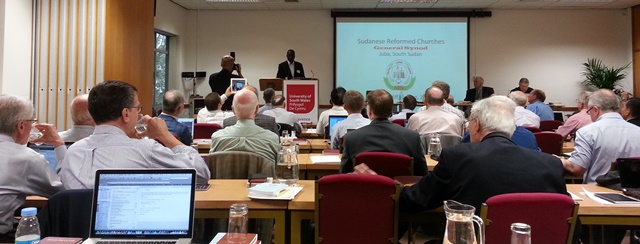The SRC started as a small house fellowship in Khartoum, Sudan in February1992. It was time of great Christian persecution in Sudan. By God’s grace SRC has now grown into 16 churches all over South Sudan and Sudan with 8 ordained pastors and 15 evangelists. In the SRC strategic plan (2011-2015), it is hoped to plant 36 more churches: 25 in South Sudan and 11 in Sudan!
The conference then divided into four discussion groups or "workshops", one of which I was assigned to chair, in which the paper given at yesterday's evening session by Rev Dr Robert Letham was discussed. Our discussion for an hour was stimulating and rewarding. Dr Letham had raised issues in his paper that really got us thinking. For example, in what sense is the preaching of the Word of God "infallible"? Or, is the preaching itself "the Word of God" at the same time as it is preaching "from the Word of God"? Also, in what is usually called "revival" when many more people are converted than at other times and when the power of the Holy Spirit is experienced above what is known at other times, is the preacher himself changed, does the preaching changed? In addition, does a concentration on the need for "revival", including praying for this, tend to demote the preaching of the Word in circumstances outwith "revival" to an "ordinary" level. And is it right to pray for "extraordinary" preaching (in the sense of what is associated with "revival) with preaching outwith such occasions regarded as "ordinary"? Finally, what do we mean by "revival" when we think of the preaching of the Word of God? So, the theologians back home should have plenty here to get their teeth into till I get back!
As you can imagine there were many contributions to the discussion, not all of the same mind! But we ended the discussion with the conviction that preaching and the Holy Spirit are inseparably joined, what Letham calls "distinct but inseparable ( this also applies to the Trinity, the two natures of Christ, the composition of human beings as physical and spiritual). We also agreed that the preaching of the Word of God carries out the sovereign will of God in the sense that his word never returns to him "void" or "empty" and always accomplishes what he has chosen to bring about both in the conversion of some and the hardening by others of themselves under the Word.
 A break in the afternoon from 3-5.30pm helped me to catch up on some emails and to make a start on this blog post! After our evening meal we had the second lecture of the conference delivered by Rev James Visscher, a minister in the Canadian Reformed Churches, whose topic was "The Nature of Preaching". Again, on Monday we are due to discuss this paper in our workshops.
A break in the afternoon from 3-5.30pm helped me to catch up on some emails and to make a start on this blog post! After our evening meal we had the second lecture of the conference delivered by Rev James Visscher, a minister in the Canadian Reformed Churches, whose topic was "The Nature of Preaching". Again, on Monday we are due to discuss this paper in our workshops.After the evening session Rev Patrick Jok met with Iain D Campbell, Rev David Miller and myself, as representatives of the Ecumenical Relations Committee, to discuss how the Free Church might be able to set up closer relations with the Sudanese Reformed Churches and what the relationship would mean to both denominations. This was a very interesting and productive discussion and again Patrick impressed us with his account of how the denomination had started with small beginnings, with himself actually, and had grown by God's blessing to the 16 congregations they presently have. It would be wonderful if we could have Patrick speak to ujs back in Scotland about the Sudanese Reformed Churches and their commitment to church planting, evangelism, theological education in schools and their overall approach to what it is to serve Christ in the gospel.
Tomorrow (Saturday) most of the delegates are going on arranged trips to local sights, one group to a coal mine and Caerphilly Castle, the other to Cardiff and Cardiff Castle. Apparently Wales has more castles in proportion to its total area than any other country in the world! Mind you, it maybe has something to do with that lot over the border!
I will try and find time when we get back from the trip to give a brief account, provided I don't get left down the coal mine!
.jpg)


.jpg)
.jpg)

















